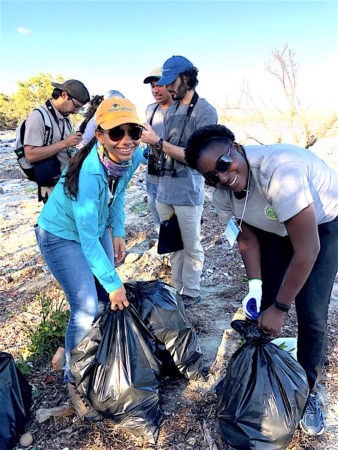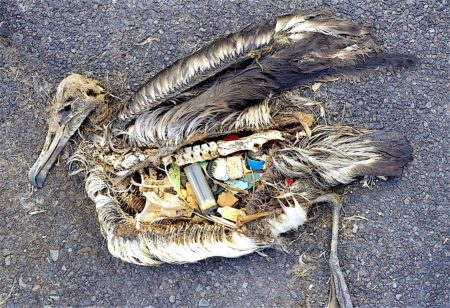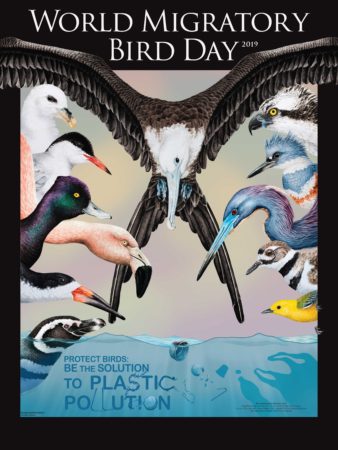Plastic is killing our planet – not least our beautiful birds. But you can help! This year, the Caribbean Endemic Bird Festival (CEBF) and World Migratory Bird Day (WMBD) address this critical issue with the conservation theme Protect Birds: Be the Solution to Plastic Pollution.
While migration is in full swing, in the Caribbean, it’s a time to celebrate the birds that live only in the region and that stay here all year round. The Caribbean Endemic Bird Festival, organized by BirdsCaribbean, focuses on these special birds that we know and love. CEBF events are held between Earth Day on April 22nd and International Biodiversity Day on May 22nd.
What can we do about plastic?

We know that all the plastic ever manufactured since the 1950s is still with us, in some form or another. Globally, only around 9% of plastic is recycled. According to the Ocean Conservancy, which sponsors International Coastal Cleanups in the Caribbean and around the world, 8 million metric tons of plastic enter our seas annually – adding to the 150 million tons that is already floating around!
Like other parts of the world, the Caribbean has become increasingly aware of the scourge of plastic pollution. Several islands have already moved to ban various forms of plastic as well as Styrofoam, including Antigua & Barbuda, Dominica, Grenada, Jamaica, Saint Lucia and the French-speaking islands—kudos to these countries! Others have plans in place to reduce the use of single-use plastic in the next year or two. Meanwhile, private and government-led plastic recycling programmes have started up. But much more needs to be done.
Plastic pollution ruins our beautiful beaches and coastlines, and blocks drains and gullies. It impacts our own health and lifestyle and hampers economic growth, especially in the tourism sector. What is more, it is harming all kinds of marine life, including endangered Caribbean turtles.
During recent beach cleanups around the Caribbean, non-biodegradable, indigestible plastic has been by far the most common type of trash to be collected from our shorelines, rivers and gullies by local volunteers. Plastic bottles, especially for soda and water, are the most common plastics that end up in our waters and on our beaches, as well as small items such as bottle caps, single-use plastic cutlery and straws and toothbrushes. Electronics (e-waste) of various types is increasingly washing up on our shoreline. Plastic shopping bags are also a great danger to our marine life, including birds.
Killer Trash

Have we thought about how plastic affects our birds? It is estimated that 80% of seabirds and waterbirds have ingested plastic.
“Plastic pollution is a global issue. Here in the Caribbean it is having a major impact, not only on our important tourism product, but also on our fragile environment,” explained festival coordinator Sheylda Diaz Mendez. “Our islands are home to over 170 endemic birds – found nowhere else in the world. Just like our human visitors, the birds that live year-round on our islands need to feel welcome and comfortable in a clean, healthy environment. Solid waste, mostly consisting of plastics, is upsetting the balance of our ecosystems, for birds and for ourselves.”
“The number of seabirds dying as a result of plastic may be as high as one million annually,” said BirdsCaribbean Executive Director Lisa Sorenson. “Many Caribbean birds are eating plastic daily. The pileup of plastic can also hamper nesting, breeding and feeding on land and prevents important habitats such as mangroves and wetlands from flourishing. This year, our volunteer CEBF coordinators will be organizing this spring, to raise awareness about plastics pollution, how you can reduce your use of single use plastic, doing clean-ups and other activities.”

Plastic breaks down into tiny fragments (microplastics), which can be ingested and lead to disease and suffering in birds – as well as in smaller members of the food chain that birds may eat. It can gradually kill a bird, filling its stomach and essentially starving it to death. Plastic bags can choke and smother birds and animals. In the Caribbean, birds often become entangled in plastic fishing nets, lines, and other equipment, causing serious injury or death.
Which birds are particularly impacted by plastic pollution? The twelve bird species selected for the beautiful WMBD poster produced by Environment for the Americas this year have each been negatively affected by plastic, even though their feeding habits and the places where they live are very different. They are the Magellanic Penguin; the Black Skimmer, which feeds by flying low over the waves; the Lesser Scaup, a diving duck; the Chilean Flamingo; the Common Tern; the Northern Fulmar; the Magnificent Frigatebird (which you may see soaring around our coastlines), the splendid Osprey, a fish hawk; the lively Belted Kingfisher; the stately Tricolored Heron; the Killdeer, a shorebird; and the lovely yellow Prothonotary Warbler.
By the way, the gorgeous artwork on this poster is by Arnaldo Toledo Sotolongo, from Santa Clara, Cuba, a BirdsCaribbean member, who works as a scientific illustrator, photographer and designer and volunteers in conservation projects in his free time.
Be the Solution
Plastic is a worldwide epidemic. We need to work together to be the solution, for the sake of our birds and ourselves!
What YOU Can Do to Beat Plastic Pollution:
- Use reusable metal bottles for your drinking water.
- Travel with your own metal cutlery and use glass or metal storage containers.
- Take cloth shopping bags with you to the grocery store.
- Try reusable bamboo or metal straws.
- Refuse plastic straws or containers in restaurants and stores.
- Avoid plastic packaging in food stores as much as possible, including clamshell containers.
- Take your plastics to the nearest recycling centre.
- Reuse plastic items as much as possible in and around the home.
- Host a beach or community cleanup day. Get local companies on board as sponsors. Share your photos.
- Get involved! Join a local environmental or community group. Get your neighbours involved, too!
- Design art competitions highlighting the problem of plastic trash.
Contact your local environmental group to find out about events on your island, or contact BirdsCaribbean to organize an event of your own.
The Caribbean Endemic Bird Festival celebrates the 172 species of birds that are found only in the Caribbean and nowhere else in the world. World Migratory Bird Day (WMBD) is a celebration of the thousands of birds that make their way to and fro across the Americas and the Caribbean each year. To raise awareness about the need for bird conservation, volunteer coordinators organize events in the Caribbean in April and May for CEBF and September and October for WMBD. For much more information about CEBF, WMBD and the 2019 plastics theme, visit www.BirdsCaribbean.org and www.migratorybirdday.org/
Learn more about plastics pollution and what you can do to help: https://oceanconservancy.org/trash-free-seas/






